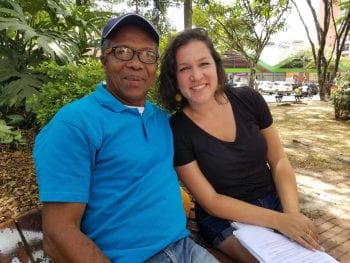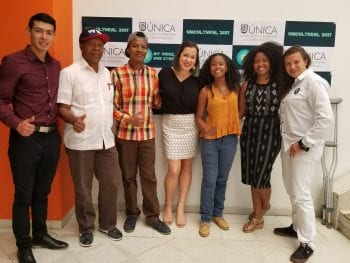
What does it mean to feel heard, to be truly listened to? This is one of the crucial questions that alumna Sarah Cohen (AB ’11) considered throughout the stages of her project, Mi Voz, Nuestra Historia (My Voice, Our Story). The project, first implemented in fall 2017, aimed to train 50 pre-service teachers in creating inclusive and equitable classrooms in post-conflict Colombia. One major aspect of the project is a documentary spotlight on three Afro-Colombians’ experiences in the Colombian armed conflict and their participation in the Fundación Escuela Ciudadana (Citizens’ School) program in Cali, Colombia, where they met and grew their capacity as activists and community organizers. The goal of the documentary is to give a platform to a community that has long been marginalized in Colombia. The video was integrated into the teacher training workshop component of the project in order to foster dialogue and provide a model for the use of digital storytelling to challenge the dominant narrative. Mi Voz, Nuestra Historia provides an opportunity for teachers to think critically about how methodologies of digital storytelling and popular education* can build a more inclusive classroom environment and what their roles are in building equity in their classrooms.

Sarah shared the experience that helped kick-start the project: “Last spring, I was chosen to attend a conference through U.S. Alumni TIES, entitled ‘Education for All: Inclusion and Access as Pathways to Peace.’ The conference was specifically for alumni of U.S. State Department exchange programs. Combining my Special Education teaching experiences in the United States and my Fulbright experience in Bogota, I came up with a project idea around using digital storytelling as a way to train teachers to build more inclusive classrooms in post-conflict Colombia.” She received an Alumni TIES Small Grant to support the project. She credits the Alumni TIES program for helping her learn more about digital storytelling as a methodology for inclusion. Throughout the experience, Sarah has pushed herself to find new ways to use digital media, storytelling, and shared learning as tools for peace-building. Sarah believes in the power of digital media to be a transformative teaching tool because of its ability to enable participants to become the teachers. The project also catalyzed a research paper that Sarah coauthored with Jessica Peng, entitled “Imagining New Forms of Knowledge Production: The Role of Visual Communications in International Educational Practices.” The paper was presented at the 62nd Annual Meeting of the Comparative and International Education Society in Mexico City in March 2018.
Sarah’s community engagement precedes her work on Mi Voz, Nuestra Historia. In 2009, she participated in a service-learning program in Santiago, Chile through the Gephardt Institute. She describes the experience as formative to her understanding of civic engagement. Sarah sees continuity between her service experiences as an undergraduate with the Gephardt Institute, her teaching experiences in the South Bronx, the work she has done in Colombia, and her role now as an Instructional Coach for teachers in Chicago Public Schools. She said, “the Gephardt experience can launch your involvement for years to come.” Sarah remarked on how the institute shows students that there are many access points for community engagement, “through your traditional work life, through a connection you’ve made and maintained, or through projects in the community focused on a particular issue.” She encourages students to expand their thinking about their own impact to the global level and to talk to people about what they can do to help. As Mi Voz, Nuestra Historia demonstrates, effective change-making requires intentional listening.
Mi Voz, Nuestra Historia creates a model for the way that digital storytelling can be utilized to allow people with diverse experiences to use their own voices to share their experiences. Watch the documentary, created and produced by Sarah, here. For ideas on how to structure conversations around the film within your classroom or organization, reach out to Sarah at mivoznuestrahistoria@gmail.com.
*Paulo Freire, the Brazilian educator and philosopher of critical pedagogy, defined popular education as “an educational approach that collectively and critically examines everyday experiences and raises consciousness for organizing and movement building, acting on injustices with a political vision in the interests of the most marginalized.”